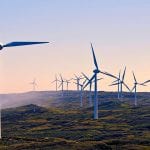Around The Web
Fossil fuels fall to record low in Britain's energy mix, data shows
Solar and wind farms produce more electricity than any other source for first time
Fossil fuels fell to a record low in the UK’s electricity mix in recent months after wind and solar farms generated more energy than any other source for the first time.
The government’s official figures showed the UK relied on renewables for 38.9% of its electricity in the third quarter of this year, up from a third in the same period last year.
Continue reading...SK Market: Govt on the defensive as KAUs notch new record highs daily
Nodal Exchange set to launch first physically-delivered California LCFS contract
Do you have a favourite tree? Share your pictures and stories
As part of a new series, we’d like you to tell us about your favourite tree and why it’s special to you
As deforestation continues to threaten green space around the world, and the Guardian’s Christmas appeal launches to tackle it, we’d like to celebrate our trees.
Outside of their ecological value, many of us have sentimental attachment to trees. Perhaps an established tree reminds you of home, travel, or your childhood, or is simply beautiful.
Continue reading...Melbourne apartment block shares rooftop PV, battery storage – smashes solar ceiling
 A 70kW solar 54kWh battery system installed on Melbourne apartment block uses Allume Energy technology to share cheap clean power between 52 low-income tenants.
A 70kW solar 54kWh battery system installed on Melbourne apartment block uses Allume Energy technology to share cheap clean power between 52 low-income tenants.
The post Melbourne apartment block shares rooftop PV, battery storage – smashes solar ceiling appeared first on RenewEconomy.
I didn't buy any food for a year - and I'm healthier than I've ever been
Rob Greenfield gardened, fished and foraged to eat more sustainably and encourage others to do the same. But to succeed, he needed the community
For the last year I grew and foraged 100% of my food. No grocery stores, no restaurants, not even a drink at a bar. Nature was my garden, my pantry and my pharmacy.
Most people would imagine I live in the countryside on a farm, but actually I live in a city; Orlando, Florida, a few miles from the centre. When I arrived here, I didn’t own any land, so in order to grow my food I met people in the neighbourhood and turned their lawns into gardens and shared the bounty of food with them. I’m a big believer in the philosophy “grow food, not lawns”.
Continue reading...New Zealand outlines provisional carbon budget, ETS cap
2020 to be one of hottest years on record, Met Office says
Temperatures are expected to be more than 1.1C above pre-industrial average
Next year is likely to be another of the hottest on record, with global temperatures forecast to be more than 1.1C above the pre-industrial average, according to estimates from the Met Office.
The forecast for 2020 is based on observations of trends over recent years that have seen a series of years more than 1C above pre-industrial levels, and bearing what meteorologists said was the “clear fingerprint” of human-induced global heating.
Continue reading...Evergen teams with Solar Services Group to boost battery uptake
 New partnership promises to "dramatically reduce" home battery ROI, while also creating one of the world's biggest virtual power plants.
New partnership promises to "dramatically reduce" home battery ROI, while also creating one of the world's biggest virtual power plants.
The post Evergen teams with Solar Services Group to boost battery uptake appeared first on RenewEconomy.
Lawn-mowing reduction can help wildlife, says study
Researchers show disturbance to lawns increases likelihood of pest and weed invasion
Rewilding gardens may be growing in popularity but even a modest reduction in lawn mowing can boost wildlife, increase pollinators and save money, according to a study.
Researchers from the University of Quebec at Trois-Rivières found that reducing the intensity of trimming lawns in urban areas can also reduce pests and weeds that cause allergies.
Continue reading...Collapse in Queensland renewables investment – the canary in the coal mine
 In 2019 construction commitments to large wind and solar farms in Queensland completely dried-up, killing more than 1,000 jobs along the way.
In 2019 construction commitments to large wind and solar farms in Queensland completely dried-up, killing more than 1,000 jobs along the way.
The post Collapse in Queensland renewables investment – the canary in the coal mine appeared first on RenewEconomy.
AER will farewell CEO Michelle Groves in May 2020
 After fifteen years as the AER’s Chief Executive Officer, Michelle Groves has announced her departure from the agency in May 2020.
After fifteen years as the AER’s Chief Executive Officer, Michelle Groves has announced her departure from the agency in May 2020.
The post AER will farewell CEO Michelle Groves in May 2020 appeared first on RenewEconomy.
Musselroe Wind Farm to deploy bird protecting radar in Australian first trial
 Tasmania's Musselroe Wind Farm to trial bird detection radar its operator hopes will minimise the impact on wedge-tailed eagle populations.
Tasmania's Musselroe Wind Farm to trial bird detection radar its operator hopes will minimise the impact on wedge-tailed eagle populations.
The post Musselroe Wind Farm to deploy bird protecting radar in Australian first trial appeared first on RenewEconomy.
Massive 1,200MW Wide Bay wind farm gets kick start from state government
 Queensland's Wide Bay region set to host one of the Southern Hemisphere's biggest wind farms, after QLD government helps faciliate investment deal.
Queensland's Wide Bay region set to host one of the Southern Hemisphere's biggest wind farms, after QLD government helps faciliate investment deal.
The post Massive 1,200MW Wide Bay wind farm gets kick start from state government appeared first on RenewEconomy.
Consumers don’t value grid reliability quite as much as they used to
 Consumers have put a lower value on reliability than they did five years ago, a key input into how much should be invested in networks, emergency reserves, and in the new market design.
Consumers have put a lower value on reliability than they did five years ago, a key input into how much should be invested in networks, emergency reserves, and in the new market design.
The post Consumers don’t value grid reliability quite as much as they used to appeared first on RenewEconomy.
Scientists use microscopic “windows” to create see-through silicon solar cell
![]() Scientists develop new technique to produce see-through silicon wafers, that could see solar integrated into your office, car and even your mobile phone.
Scientists develop new technique to produce see-through silicon wafers, that could see solar integrated into your office, car and even your mobile phone.
The post Scientists use microscopic “windows” to create see-through silicon solar cell appeared first on RenewEconomy.
Climate change: Met Office says warming trend will continue in 2020
Western Australia’s first big battery delivered to Kalbarri microgrid
 A 5MW/2MWh battery has been dispatched to Western Power’s Kalbarri microgrid, where it will help deliver cheap reliable renewable power to the W.A. resort town.
A 5MW/2MWh battery has been dispatched to Western Power’s Kalbarri microgrid, where it will help deliver cheap reliable renewable power to the W.A. resort town.
The post Western Australia’s first big battery delivered to Kalbarri microgrid appeared first on RenewEconomy.



